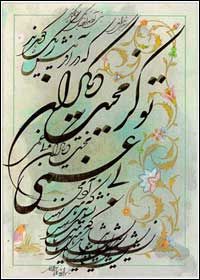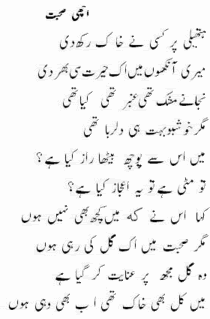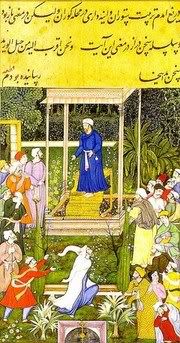 Adil Najam
Adil Najam
Raza Rumi’s blog (Jahan e Rumi) is always worth a visit. Today, I found there these wonderful English and urdu translations of Saa’di (below). But what really caught my eye was this comment from Raza which I thought was pertinent related to our own discussion on education here at ATP:
Here is what Raza is talking about. The original is from Sa’adi’s Gulistan. The English translation is by Ammar Qureshi and the Urdu translation is by a certain ‘A.Q. Librarian’ and was sent to Raza by Isa Daudpota (who happens to be one of the most principled people I know and an inspiration to so many of us; I hope to write a post on Isa soon).
Perfection of my Companion
A sweet-smelling piece of clay, one day in the bath,
Came from the hand of a beloved one to my hand
I asked: “Art thou musk or ambergris?
Because thy aromatic odour intoxicates me.”
It replied: “I was a despicable lump of clay;
But for a while was in the company of a rose.
The perfection of my companion took effect on me
And, if not, I am the same earth which I am.”





















































Aziz, I found those lines attributed to saadi at this web site. They are under story # 22:
http://www.geocities.com/drmuhammadiqbal/gulistan. htm
Owais, I was not aware that Saadi had written these lines: “To whom shall I complain against thy hand…” Now I know where Faiz got his inspiration from when he wrote the following lines:
Banay haiN ahl-e-hawas muddayee bhi munsif bhi
Kisay wakeel karain, kis say munsafi chaahain
I wonder if you could write the original Farsi couplet here. Thanks.
This post is very helpful for discussion towards Quality of Education. Good education can trasform brick into marble. To substantiate Rumi’s point of view, Kaldip Nayer (famous journalist in India) in the Daily Dawn today writes,
“The founders of independent countries will always stay in the mind of their nations: Mahatma Gandhi and Jawaharlal Nehru in India and Quaid-i-Azam Mohammad Ali Jinnah and Liaquat Ali Khan in Pakistan. Sheikh Mujibur Rahman and Tajuddin were the guiding spirit during the liberation struggle; their names will remain in the annals of Bangladesh. Time will not erase B.P. Koirala’s fight against the monarch of Nepal. Similarly, S.W.R.D. Bandaranaike will be remembered whenever Sri Lanka’s sovereignty is discussed.
They were all tall men, the product of freedom struggles. As the days go by, their names will shine more resplendently. It is the new crop of leaders which is proving Churchill right. They are either Zeroes or Neros. With mediocre qualities and unbounded greed, they have made their country pay for their poor performance. They have no commitment, no value system, no sensitivity. They are men of straw, going with the wind in whichever direction it blows.” http://www.dawn.com/2006/08/12/op.htm#2
I first read Saadi’s Gulistan and Bostan (in Urdu) when I was in grade IV. The books were not part of the course but were lying around in the house. I picked them up and read them as stories. I must admit, I’ve forgotton about them since then. Reza sahib’s post made me revisit the ‘hikayaat’ on internet again. In one of the ‘Bostan’ stories I found these lines which I like:
To whom shall I complain against thy hand
If I am to seek justice also from thy hand?